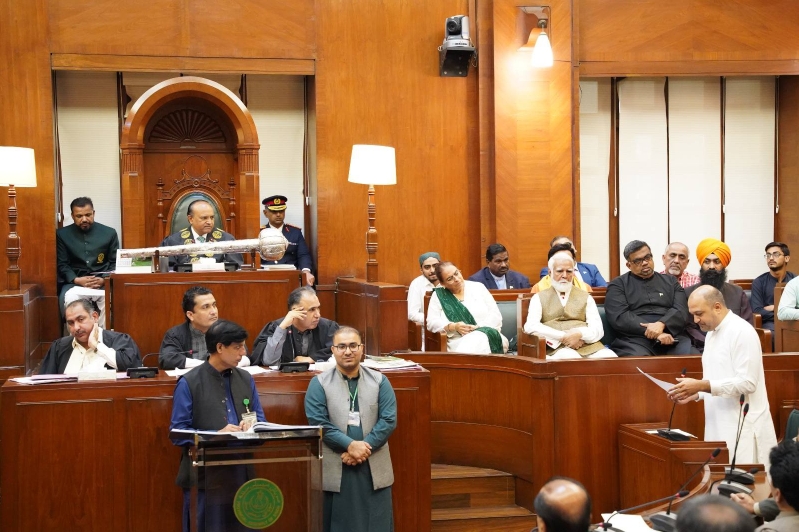
In a significant move aimed at curbing discrimination and intolerance against religious minorities of Pakistan, a provincial legislative assembly on Aug. 11 unanimously recommended that the term “minority” be removed from the Constitution of Pakistan and replaced by language that reflects equality and dignity for all citizens irrespective of their religion, caste or creed.
The recommendation was introduced in the Sindh Provincial Assembly by its first Christian deputy speaker, Anthony Naveed, during a special session marking National Minorities Day, according to various mainstream media reports.
Observed annually on Aug. 11, National Minorities Day honors Pakistan’s religious minorities who have contributed to creating Pakistan and in nation-building. It commemorates the speech of Pakistan’s founding father, Muhammad Ali Jinnah, to the legislature on Aug. 11, 1947, days before Pakistan separated from India, in which he pledged to protect the rights of non-Muslims in the newly created country. The government declared Aug. 11 as National Minorities Day in 2009.
The resolution moved by Naveed condemned all forms of discrimination, intolerance, hate speech, violence and any force or undue influence in matters of faith, particularly involving minor girls from minority communities. It called upon the provincial government to ensure that any change in faith or belief identity was made only with free, informed and voluntary consent.
The resolution also demanded that the government protect worship places, sacred sites and cultural heritage of faith-based communities, and provide victims of rights violations with timely justice, security and rehabilitation.
The House urged the provincial government to reserve a 5% quota in all educational institutions and a 10% quota in all scholarships for students from faith-based communities, in addition to merit, at the provincial, federal and international levels.
The House also urged the government to establish a provincial faith rights protection authority to monitor violations, provide legal aid and recommend policy reforms.
It also urged the provincial government to incorporate a dedicated lesson in the curriculum from primary education, highlighting Jinnah’s Aug. 11 speech with a specific focus on his vision and assurances regarding the rights and status of minorities.
Speaking on the resolution, Sindh Chief Minister Murad Ali Shah lauded the historic vision of the country’s founding father, calling Aug. 11 a day that reminded the nation of Jinnah’s landmark speech.
“We are gathered here in the same assembly hall where the Pakistan Resolution was first passed,” Shah said. “On Aug 11, 1947, Quaid-i-Azam presented his vision for running the country, declaring that everyone was free to go to their temples, mosques, or any other place of worship and that religion or belief had nothing to do with the affairs of the state.”
Leader of the opposition Ali Khurshidi said that Jinnah was against sectarian prejudice, but unfortunately nationalist prejudice also came into play. “This issue needs to be taken seriously,” he said.
Sindh Senior Minister for Information, Transport and Mass Transit Sharjeel Inam Memon said that while the green crescent flag symbolized Pakistan’s independence, its white portion stood as a guarantee for the rights and freedoms of minorities.
Muttahida Qaumi Movement-Pakistan’s Hindu lawmaker Mahesh Kumar Hasija highlighted the contributions of the minority communities to the development of the province and paid tribute to a Hindu, Seth Jaji R. Vishandas, who had introduced electricity to Karachi, earning it the title “City of Lights.”
Sindh Local Government Minister Saeed Ghani said that protection of non-Muslims dated back to the time of Islam’s Prophet Muhammad and the Muslim caliphs. He emphasized that Islam prohibits harm to non-Muslims, adding that minorities in his constituency were treated with respect.
Minorities Alliance Pakistan Chairman Advocate Akmal Bhatti welcomed the resolution passed by the Sindh Assembly, but said that merely replacing the word “minority” from the Constitution of Pakistan with a more favorable term was not enough to bring the status of religious minorities at par with the Muslim majority.
“Articles 40 and 91 of the Constitution of Pakistan restrict non-Muslim citizens from assuming the offices of Pakistan’s president and prime minister. We have repeatedly demanded amendments to Articles 36, 40, 51, 91, 106 and 203 of the Constitution to end the constitutional discriminatory treatment of non-Muslim citizens and enable them to live as equal citizens of Pakistan,” he said.
In Pakistan, religious minorities, excluding Ahmadis who are constitutionally declared non-Muslim, comprise an estimated 3.5% of the population. This includes Christians, Hindus, Sikhs, and others.
Based on Pakistan’s 2023 census, Muslims constitute 96.4% of the population. While the census indicates 1.4% Christians and 1.6% Hindus, these figures are disputed by Christian leaders who claim the census undercounts their population.






